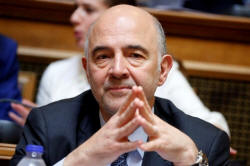|
Greece has signed up to three international bailouts since 2010,
when its debt crisis broke out, in exchange for unpopular
reforms and painful austerity. The third program expires on Aug.
20.
"Greece can now stand on its own two feet," Moscovici, who is
economic and financial affairs commissioner, told the Greek
parliament. "The time has come for Greece to be a normal
country."
Prime Minister Alexis Tsipras wants Greece to rely on debt
markets for its financing needs without any more external
support, although some economists have said it would be wise to
secure a precautionary credit line from the European Union or
International Monetary Fund.
The "troika" of mission chiefs from the EU, European Central
Bank and IMF will no longer visit Athens to review its bailout
progress, a process which many Greeks saw as evidence that the
country lost part of its sovereignty during the crisis.
"The troika will not return here," Moscovici said to lawmakers'
applause. "We'll write a new chapter together," he said, adding
that Europe would stand by Greece in the post-bailout period.
Moscovici, who earlier met Finance Minister Euclid Tsakalotos,
said the debt relief measures agreed last month were the best
the European lenders had to offer. He told reporters that Greece
was finished with bailouts. "There is no more program for
Greece. There won't be any more programs for Greece," he said.
Greece has agreed to implement more pension cuts and tax
increases in 2019-2020 after the end of the bailout.
Asked if the legislated pension cuts could be reversed,
Moscovici said: "Commitments must be respected."
(Reporting by Lefteris Papadimas; Additional reporting Stavros
Agorakis; editing by David Stamp)
[© 2018 Thomson Reuters. All rights
reserved.] Copyright 2018 Reuters. All rights reserved. This material may not be published,
broadcast, rewritten or redistributed.
Thompson Reuters is solely responsible for this content.
 |
|




